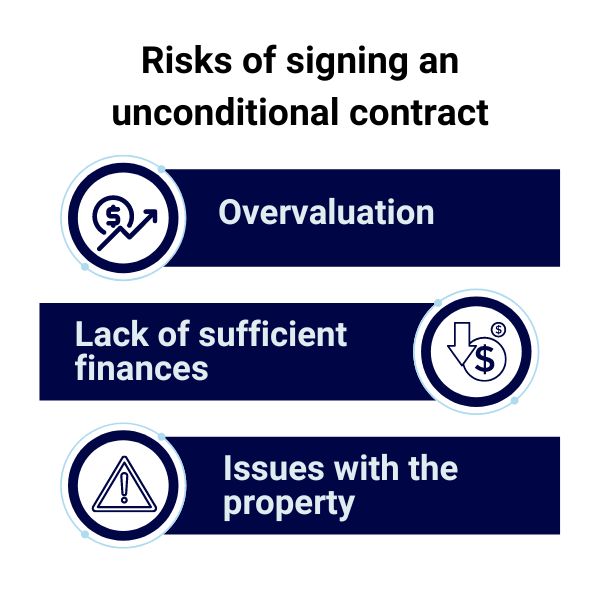During the fast-moving consideration phase, buyers may feel pressured to sign an unconditional contract.
While it can seem like an effective strategy to make the most of a ‘good opportunity’, most buyers don’t realise the risks involved. Whether buying at auction or through a private sale, it’s important to understand what an unconditional contract is, and if it’s worth it.
What is an unconditional contract?
Every property transaction will involve a legal document that outlines the terms of the sale for both the seller and the buyer, known as the contract of sale.
In most cases, the contract of sale will include certain conditions that safeguard the interests of the buying and selling parties respectively.
An unconditional contract is a type of contract of sale that does not include any conditions for the sale. This means that once the contract is signed by the buyer and seller, they will be obligated to proceed with the settlement of the transaction and transfer of ownership.
Naturally, this places the buyer at a certain disadvantage, as aspects of the property such as its condition are not guaranteed. For the seller, however, an unconditional contract is favourable in the sense that it provides a certainty that the sale will be completed without being hindered by any conditions.
When are unconditional contracts used?
Unconditional contracts are mostly used in cases where a buyer needs to secure or speed up the finalisation of a property transaction. With no conditions, all the usual obligations that sellers have to deal with are taken out of the picture.
In cases where the property transaction will need to be completed urgently, an unconditional contract can accelerate the entire process, provided both parties are sure of entering the contract.
Risks of signing an unconditional contract
Signing an unconditional contract comes with various risks that can be both costly and disastrous — property purchases involves huge financial costs and should be approached cautiously.
We’ve outlined some of the risks that are posed by entering into an unconditional contract:
Overvaluation
Overestimating the property’s value can lead to spending significantly more money than intended. If the property’s value is decidedly lower than the purchase price, buyers may not even have the right to proceed with the contract, and the lender may decide not to provide the finance amount due to the lack of sufficient equity in the property to secure the loan.
Lack of sufficient finances
By making an unconditional offer, there’s a risk that the financial lender may end up not providing the approval on the requested loan or may not be able to send the funds in time for the settlement to be completed successfully. If this happens, the buyer may not be able to settle the property and will lose their original deposit.
When deciding whether to proceed with an unconditional contract offer, buyers should ensure that they have the requisite funds needed to complete the settlement, whether through personal finance or loan approval.
Issues with the property
An unconditional contract offers no assurances for any issues that develop in the property during the term of the contract before settlement. Even if buyers aim to conduct a thorough due diligence investigation of the property, they can still be impacted by any unfortunate issues that arise later on.
This means that buyers will have to go through with the settlement regardless of the state of the property.
Can a buyer pull out of an unconditional contract?
In general, yes, but not easily. In Australia, each state has their own requirements for whether a cooling-off period will apply to the unconditional contract. In NSW and QLD, for example, buyers have a cooling period of 5 business days to retract their decision to purchase the property, even on an unconditional contract. However, they will still be liable to pay 0.25% of the sale price.
Other states have stricter requirements, such as VIC, where there is a cooling-off period of only 3 days with a 0.2% purchase price forfeit, as well as TAS where there is no cooling-off period for any sale.
Can a seller get out of an unconditional contract?
Compared to buyers, it’s much more difficult for sellers to pull out of an unconditional contract. Save for exceptional cases, sellers are not permitted to exit from an unconditional contract.
Get expert property purchase advice with Entry Conveyancing
Unconditional contracts are high-risk strategies for both buyers and sellers that should be carefully considered before proceeding. Seeking advice from an expert conveyancer is the best way to understand whether an unconditional contract is worth using for a property purchase.
At Entry Conveyancing, our team of conveyancers in Sydney, Brisbane, and Melbourne are perfectly qualified to offer tailored advice for both buyers and sellers to ensure a smooth settlement with minimal risks. Contact us today for a free quote!






